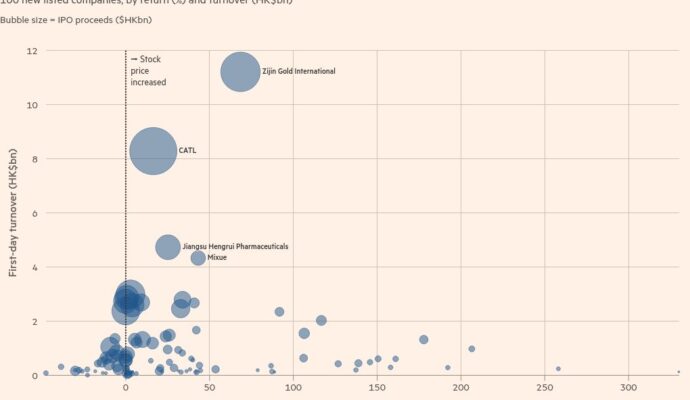Unlock the Editor’s Digest for free
Roula Khalaf, Editor of the FT, selects her favourite stories in this weekly newsletter.
Surveillance drones hover over white-and-pink poppy fields in rural Pakistan, guiding men armed with assault rifles, weedicide sprayers and weed whackers — all part of a government operation to search out and destroy the farms that supply the key ingredient for opium and heroin.
Since Afghanistan’s Taliban rulers banned the lucrative crop three years ago, Pakistan has emerged as one of the world’s biggest suppliers of opium, with output increasing sharply this year as stockpiles decline.
Officials in the border province of Balochistan fear that ballooning cultivation could turn it into an opium production hub, fuelling addiction at home, damaging Pakistan’s reputation in Europe and enriching militant groups behind insurgencies that led to more than 2,000 deaths last year.
“We will not allow one inch [of our land] to be used to cultivate poppy . . . this is a problem bringing disgrace to our nation,” Sarfraz Bugti, chief minister of Balochistan, said on Wednesday.
Videos posted online and interviews make clear authorities’ ambition to rid Pakistan of thousands of hectares of fields. “This is a war against an invasion,” an official said, putting the cost of the campaign at a minimum of Rs1bn ($3.5mn) this year alone.
“The state is cracking down hard. We are proud of our actions that took down thousands of acres of poppy this year . . . but every season, it is getting tougher and more expensive.”
The poppy trade has migrated between ungoverned pockets of Iran, Afghanistan and Pakistan, particularly flourishing during the 40 years of wars in Afghanistan that began with the Soviet invasion in 1979 and ended with Nato’s withdrawal in 2021.
Since returning to power, Taliban authorities in Afghanistan have launched a broad-based assault on poppy cultivation in the country, which previously supplied most of the world’s illegal heroin.
Afghanistan’s Islamist rulers have launched air strikes and deployed fighters to destroy crop fields, sparking stand-offs that have sometimes turned into violent shoot-outs.
The Taliban has even arrested some traffickers who helped fund the group’s 20-year jihad against Nato forces, according to a September 2024 report by the International Crisis Group.
One result of the crackdown is that poppy cultivation in Pakistan, aided by solar-powered deep wells in arid Balochistan, is returning to peaks not seen since at least the 1990s, analysts said.
Islamabad exercises little control over large swaths of Balochistan, where a separatist insurgency rages. “It’s no surprise that poppy would return to Pakistan, especially as many regions of Pakistan are challenged by militancy,” said Vanda Felbab-Brown, a senior fellow at the Brookings Institution in Washington.
Satellite imagery analysed by UK-based expert David Mansfield and geospatial company Alcis found 8,100 hectares of poppy fields in just two small areas of Balochistan.
“I’ve never seen farms this large and almost exclusively growing poppy, not even in Afghanistan in 2017 when poppy cultivation reached its peak,” said Mansfield, the author of the report.
Mansfield and Alcis estimated that the total area under cultivation during Pakistan’s 2025 harvest, including in Sindh and Khyber Pakhtunkhwa provinces, was in the tens of thousands of hectares, compared with an official tally of 380 in 2023.
That would rival the amount of land under cultivation in Afghanistan this year, according to the UN office on drugs and crime. Cultivation under the Taliban has collapsed more than 90 per cent in the past three years to just 12,800 hectares.
The surge in output, as well as vast pre-existing opium stocks hoarded by Afghan producers and underworld kingpins, appears to have kept heroin cheap enough to avoid a flood of deadlier synthetic opioids into Europe.
“Even the 8,100 hectares of poppy identified from imagery in 2025 in what is just two small areas of Balochistan — and even more could be seen in other parts of the province — would be enough to serve almost the entirety of the UK’s estimated yearly consumption of heroin of 38 metric tons,” said Mansfield.
Meanwhile, the loss of livelihoods for millions of Afghan farmers has created an ample supply of labour and skills to sow and harvest poppy, as well as a population willing to cross the porous border as tenants or sharecroppers during the growing season.
Pakistani officials have highlighted Afghan migrants’ involvement in the opium trade, among other illicit activities, in order to attract public support for a mass deportation drive. More than 800,000 people have been repatriated to Afghanistan and officials threaten to expel another 1mn before the end of the year.
Cultivation in the south-western province of Helmand, typically the source of more than half of Afghanistan’s poppy, fell 99 per cent in 2023 compared with the year before, declining from 129,000 hectares to just 740, according to data analysed by Mansfield and Alcis.
“Jobs in Helmand have basically disappeared,” said one Afghanistan-based analyst. “People are obliged to find jobs to support themselves elsewhere.”
Pakistan’s anti-narcotics force did not reply to a request for comment.
Cartography by Steven Bernard


